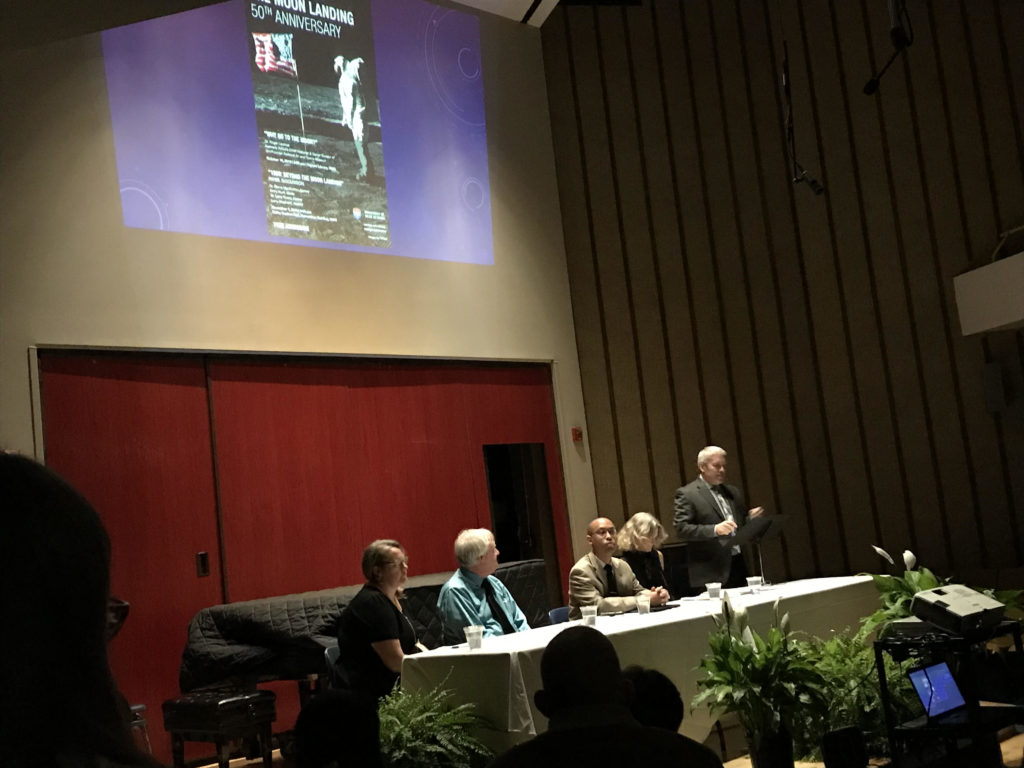There was a panel discussion held on the events surrounding the first moon landing in 1969 by speakers Dr. Elaine MacKinnon, Emily Hunt, Dr. Larry Rivers, and Larry Stephens on Nov. 4 in the Humanities Building at UWG. Discussion was centered around the Soviet Union’s influence on space travel, African-American views at the time, music about the moon and the counterculture that formed with the youth during 1969.
“In 1974, the Soviets canceled efforts to land a man on the moon,” said MacKinnon. “Why did the cosmonauts not land on the moon?”
She went on to explain that the Soviet Union did not have an equivalent to NASA and was not as organized as America in its efforts. The Soviets sent several animals into space and achieved the first human spacewalks, but chose to leave the moon alone. MacKinnon concluded her speech by pointing out that the Soviets still made many contributions to space exploration even though they did not land a person on the moon.
“We see more parallels to the West African sensibility of the moon,” said Rivers.
Rivers talked about the moon and what African Americans thought about the moon landing during 1969. He said that many African Americans were poor at the time and thought that the U.S. could spend money on fixing that issue instead of the moon missions. Rivers made it a point to talk about the first African American woman to work with NASA, Katherine Johnson. She helped to see Neal Armstrong and his crew home from the moon mission which showed just how instrumental African American influence could be to space exploration.
“The moon, the sun, the stars, and astronomical charts project a sense of hope and continue to remind us how influential space was to artists at the time,” said Hunt.
She spoke about how music affected people during 1969 and how it expressed their emotions about space travel. Many songs, such as Space Oddity by David Bowie, talk about the thrill of traveling to other places and how it would be in space. She presented segments from a few other songs to show their impact and to give everyone a feel of the sound of that era. Hunt wanted to drive home that people were afraid for the human race at that time and caught up in the problems of our world which is why they were looking for a way out to find more hope for earth.
“This is the kind of environment that a counterculture, as it were, would flourish,” said Stevens.

Stevens gave his speech about the University of West Georgia in 1969 and how they felt about the events going on in the world. This counterculture that he talked about presented itself when UWG hired on more forward-thinking individuals to its staff. However, he stated that it was a rather small presence at UWG. Stevens mainly just wanted to cover the other parts of what was going on in 1969, such as the Vietnam War. He wanted to explain how chaotic it was before the moon landings and afterward.
After the panelists had finished with their speeches, they took questions from the audience. Some people asked about professors at UWG and talked about how they lived through some of these events. Others asked about why the Soviets did not apply their knowledge to landing someone on the moon. When looking at the moon landing in 1969 and the events surrounding it, many conclusions can be made about the mindset of the people at the time. All in all, they were looking for a better future because the events that were happening on earth were not quite what they had hoped for.
You may also like
-
UWG Fails to Protect Student Safety From Radical Conservative Rhetoric Under the Guise of Free Speech
-
UWG’s Ingram Library Hosts Pop-Up Study Spot to Help Students Prepare for Finals Week
-
UWG Offers Mental Health Support And Academic Services To Maintain Student Success During Finals Week
-
UWG Alumnus Shares His Experience Exploring the Underground Flood Channels of Las Vegas
-
Georgia Students Simulate the Struggles of Dementia